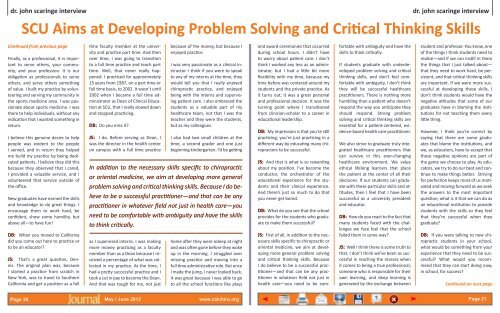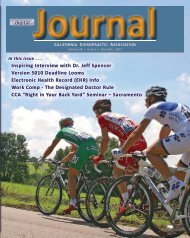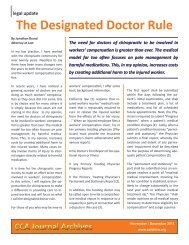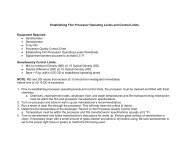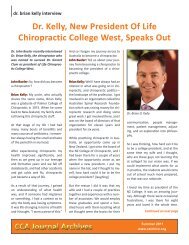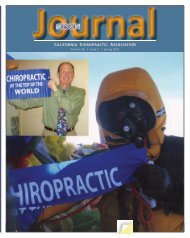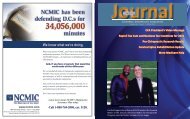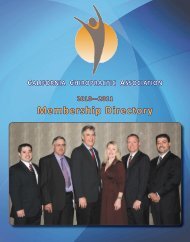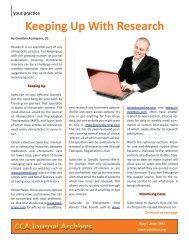Download - CCA Journal magazine
Download - CCA Journal magazine
Download - CCA Journal magazine
Create successful ePaper yourself
Turn your PDF publications into a flip-book with our unique Google optimized e-Paper software.
dr. john scaringe interview<br />
dr. john scaringe interview<br />
SCU Aims at Developing Problem Solving and Critical Thinking Skills<br />
Continued from previous page<br />
Finally, as a professional, it is important<br />
to serve others, your community,<br />
and your profession. It is our<br />
obligation as professionals to serve<br />
others, and serve others something<br />
of value. I built my practice by volunteering<br />
and serving my community in<br />
the sports medicine area. I was passionate<br />
about sports medicine. I was<br />
there to help individuals, without any<br />
indication that I wanted something in<br />
return.<br />
I believe this genuine desire to help<br />
people was evident to the people<br />
I served, and in return they helped<br />
me build my practice by being dedicated<br />
patients. I believe they did this<br />
because they observed that I cared,<br />
I provided a valuable service, and I<br />
volunteered that service outside of<br />
the office.<br />
New graduates have earned the skills<br />
and knowledge to do great things. I<br />
encourage them to work hard, be<br />
confident, show some humility, but<br />
above all—to have fun!<br />
DB: When you moved to California<br />
did you come out here to practice or<br />
to be an educator?<br />
JS: That’s a great question, Dennis.<br />
The original plan was, because<br />
I started a practice from scratch in<br />
New York, was to travel to Southern<br />
California and get a position as a full<br />
time faculty member at the university<br />
and practice part time. And then<br />
over time, I was going to transition<br />
to a full time practice and teach part<br />
time. Well, that never really happened.<br />
I practiced for approximately<br />
15 years from 1987, on a part time or<br />
full time basis, to 2002. It wasn’t until<br />
2002 when I became a full time administrator<br />
as Dean of Clinical Education<br />
at SCU, that I really slowed down<br />
and stopped practicing.<br />
DB: Do you miss it?<br />
JS: I do. Before serving as Dean, I<br />
was the director in the health center<br />
on campus with a full time practice<br />
because of the money, but because I<br />
enjoyed practice.<br />
I was very passionate as a clinical instructor.<br />
I think if you were to speak<br />
to any of my interns at the time, they<br />
would tell you that I really enjoyed<br />
chiropractic practice, and enjoyed<br />
being with the interns and supervising<br />
patient care. I also embraced the<br />
students as a valuable part of my<br />
healthcare team, not that I was the<br />
teacher and they were the students,<br />
but as my colleagues.<br />
I also had two small children at the<br />
time, a second grader and one just<br />
beginning kindergarten. I’d be getting<br />
In addition to the necessary skills specific to chiropractic<br />
or oriental medicine, we aim at developing more general<br />
problem solving and critical thinking skills. Because I do believe<br />
to be a successful practitioner—and that can be any<br />
practitioner in whatever field not just in health care—you<br />
need to be comfortable with ambiguity and have the skills<br />
to think critically.<br />
as I supervised interns. I was making<br />
more money practicing as a faculty<br />
member than as a Dean because I received<br />
a percentage of what was collected<br />
in my practice. At the time, I<br />
had a pretty successful practice and I<br />
took a cut in pay to become the Dean.<br />
And that was tough for me, not just<br />
home after they were asleep at night<br />
and was often gone before they woke<br />
up in the morning. I struggled over<br />
missing practice and moving into a<br />
full time administrative role. But once<br />
I made the jump, I never looked back.<br />
It was great because I was able to go<br />
to all the school functions like plays<br />
and award ceremonies that occurred<br />
during school hours. I didn’t have<br />
to worry about patient care. I don’t<br />
think I worked any less as an administrator,<br />
but I had a little bit more<br />
flexibility with my time, because my<br />
time before was centered around my<br />
students and the private practice. As<br />
it turns out, it was a great personal<br />
and professional decision. It was the<br />
turning point where I transitioned<br />
from clinician-scholar to a career in<br />
educational leadership.<br />
DB: My impression is that you’re still<br />
practicing; you’re just practicing in a<br />
different way by educating many chiropractors<br />
to be successful.<br />
JS: And that is what is so rewarding<br />
about my position. I’ve become the<br />
conductor, the orchestrator of the<br />
educational experience for the students<br />
and their clinical experience.<br />
And there’s just so much to do that<br />
you never get bored.<br />
DB: What do you see that the school<br />
provides for the students who graduate<br />
to make them successful?<br />
JS: First of all, in addition to the necessary<br />
skills specific to chiropractic or<br />
oriental medicine, we aim at developing<br />
more general problem solving<br />
and critical thinking skills. Because<br />
I do believe to be a successful practitioner—and<br />
that can be any practitioner<br />
in whatever field not just in<br />
health care—you need to be comfortable<br />
with ambiguity and have the<br />
skills to think critically.<br />
If students graduate with underdeveloped<br />
problem solving and critical<br />
thinking skills, and don’t feel comfortable<br />
with ambiguity, I don’t think<br />
they will be successful healthcare<br />
practitioners. There is nothing more<br />
humbling than a patient who doesn’t<br />
respond the way you anticipate they<br />
should respond. Strong problem<br />
solving and critical thinking skills are<br />
essential for a patient-centered, evidence-based<br />
health care practitioner.<br />
We also strive to graduate truly integrated<br />
healthcare practitioners that<br />
can survive in this ever-changing<br />
healthcare environment. We value<br />
ethical lifelong learners that place<br />
the patient at the center of all their<br />
decisions. If our students can graduate<br />
with these particular skills and attitudes,<br />
then I feel that I have been<br />
successful as a university president<br />
and educator.<br />
DB: How do you react to the fact that<br />
many students faced with the challenges<br />
we face feel that the school<br />
failed them in some way?<br />
JS: Well I think there is some truth to<br />
that. I don’t think we’ve been as successful<br />
in reaching the masses when<br />
it comes to being a true professional,<br />
someone who is responsible for their<br />
own learning, and deep learning is<br />
generated by the exchange between<br />
student and professor. You know, one<br />
of the things I think students need to<br />
realize—and if we can instill in them<br />
the things that I just talked about—<br />
that they need to work hard, be persistent,<br />
and that critical thinking skills<br />
are important. If we were more successful<br />
at developing these skills, I<br />
don’t think students would have the<br />
negative attitudes that some of our<br />
graduates have in blaming the institutions<br />
for not teaching them every<br />
little thing.<br />
However, I think you’re correct by<br />
saying that there are some graduates<br />
that blame the institutions, and<br />
we, as educators, have to accept that<br />
those negative opinions are part of<br />
the game we choose to play. As educators,<br />
we try to do our best and continue<br />
to make things better. Striving<br />
for perfection keeps most of us motivated<br />
and moving forward as we seek<br />
the answers to the most important<br />
question; what is it that we can do as<br />
an educational institution to provide<br />
students with the skills so they feel<br />
that they’re successful when they<br />
graduate?<br />
DB: If you were talking to new chiropractic<br />
students in your school,<br />
what would be something from your<br />
experience that they need to be successful?<br />
What would you recommend<br />
that they can start doing now,<br />
in school, for success?<br />
Continued on next page<br />
Page 20 May / June 2012 www.calchiro.org Page 21


